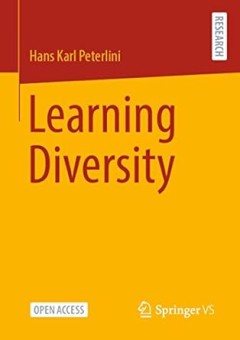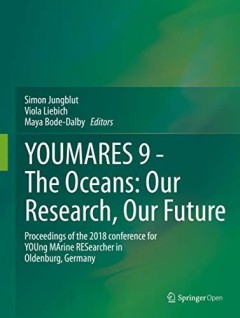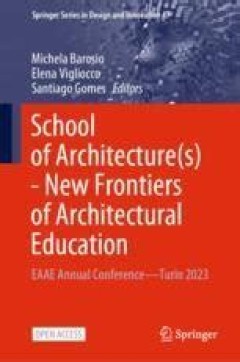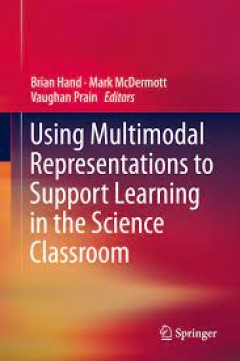Filter by

Primary Physical Science Education : An Imaginative Approach to Encounters wi…
This open access book is the first of two volumes that integrates a study of direct encounters with Primary Forces of Nature, Wind, Light, Rain, Heat and Cold, Water, etc., with imaginative narrative forms of communication. The approach developed in this book shows how the growth of cognitive tools (first of mythic and then of romantic forms of understanding) lets children make sense of expe…
- Edition
- -
- ISBN/ISSN
- 978-3-031-43953-7
- Collation
- XIV, 347
- Series Title
- -
- Call Number
- -

Learning Diversity
This Open-Access-book explores diversity in its ambivalence. On the one side, we love to describe diversity as a resource for personal, social, economic, and cultural growth. On the other side, categories of differences often lead to discrimination or serve as justifications for privileges. They can cause exclusion and, conversely, promote the self-constitution of discriminated subjects and gro…
- Edition
- 1
- ISBN/ISSN
- 978-3-658-40548-9
- Collation
- VII, 219
- Series Title
- -
- Call Number
- -

YOUMARES 9 - The Oceans: Our Research, Our Future: Proceedings of the 2018 co…
This open access book summarizes peer-reviewed articles and the abstracts of oral and poster presentations given during the YOUMARES 9 conference which took place in Oldenburg, Germany, in September 2018. The aims of this book are to summarize state-of-the-art knowledge in marine sciences and to inspire scientists of all career stages in the development of further research. These conferences ar…
- Edition
- 1
- ISBN/ISSN
- 9783030203894
- Collation
- XIX, 370 hlm,: ill, lamp;
- Series Title
- -
- Call Number
- -

Shaping the Future of Biological Education Research: Selected Papers from the…
This open access volume is a collection of full papers based on the peer-reviewed presentations accepted for the European Researchers in Didactics of Biology, ERIDOB 2022 conference. ERIDOB aims to bring together researchers in didactics of Biology from Europe and around the world to share and discuss their research work and results. It is the only major international conference whose focus lie…
- Edition
- 1
- ISBN/ISSN
- 9783031447921
- Collation
- XV, 353 hlm; ill., lamp.,
- Series Title
- -
- Call Number
- -

School of Architecture(s) - New Frontiers of Architectural Education : EAAE A…
This open access book gathers the latest advances and innovations in the field of architectural education, as presented at the 2023 annual conference of the European Association for Architectural Education (EAAE AC), “School of Architecture(s)”, held in Turin, Italy, on August 30–September 1, 2023.
- Edition
- 1
- ISBN/ISSN
- 9783031719592
- Collation
- XVII, 412 hlm,: ill, lamp;
- Series Title
- -
- Call Number
- -

Speaking in Public About Science: A Quick Guide for the Preparation of Good L…
This book introduces the basic techniques and methods traditionally used in speaking about science to the public. The public often has a very different perception and understanding of science, and this must be taken into account when communicating with the public. This volume covers methods of scientific discourse, oral communication, preparation of the presentation, techniques and use of visua…
- Edition
- -
- ISBN/ISSN
- 978-3-319-06517-5
- Collation
- -
- Series Title
- -
- Call Number
- -

Die Zukunft des MINT-Lernens – Band 1
Dieser Open-Access-Sammelband stellt Perspektiven auf digitalen MINT-Unterricht und die Lehrkräftebildung der Zukunft dar. Auf Grundlage aktueller Forschungsergebnisse beantwortet er aktuelle Fragestellungen, etwa: Welche Kompetenzen und welche Lerninhalte werden für die Herausforderungen von morgen benötigt und welchen Beitrag können die MINT-Fächer dazu leisten? Inwiefern kann die Digita…
- Edition
- 1
- ISBN/ISSN
- -
- Collation
- -
- Series Title
- -
- Call Number
- X, 238

Primary Physical Science Education
This open access book is the first of two volumes that integrates a study of direct encounters with Primary Forces of Nature, Wind, Light, Rain, Heat and Cold, Water, etc., with imaginative narrative forms of communication. The approach developed in this book shows how the growth of cognitive tools (first of mythic and then of romantic forms of understanding) lets children make sense of expe…
- Edition
- -
- ISBN/ISSN
- 978-3-031-43952-0
- Collation
- XIV, 347
- Series Title
- -
- Call Number
- -

Chemistry Education and Contributions from History and Philosophy of Science
This book explores the relationship between the content of chemistry education and the history and philosophy of science (HPS) framework that underlies such education. It discusses the need to present an image that reflects how chemistry developed and progresses. It proposes that chemistry should be taught the way it is practiced by chemists: as a human enterprise, at the interface of scientifi…
- Edition
- -
- ISBN/ISSN
- 978-3-319-26248-2
- Collation
- -
- Series Title
- -
- Call Number
- 370

Using Multimodal Representations to Support Learning in the Science Classroom
This book provides an international perspective of current work aimed at both clarifying the theoretical foundations for the use of multimodal representations as a part of effective science education pedagogy and the pragmatic application of research findings to actual classroom settings. Intended for a wide ranging audience from science education faculty members and researchers to classroom te…
- Edition
- -
- ISBN/ISSN
- 978-3-319-16450-2
- Collation
- -
- Series Title
- -
- Call Number
- -
 Computer Science, Information & General Works
Computer Science, Information & General Works  Philosophy & Psychology
Philosophy & Psychology  Religion
Religion  Social Sciences
Social Sciences  Language
Language  Pure Science
Pure Science  Applied Sciences
Applied Sciences  Art & Recreation
Art & Recreation  Literature
Literature  History & Geography
History & Geography